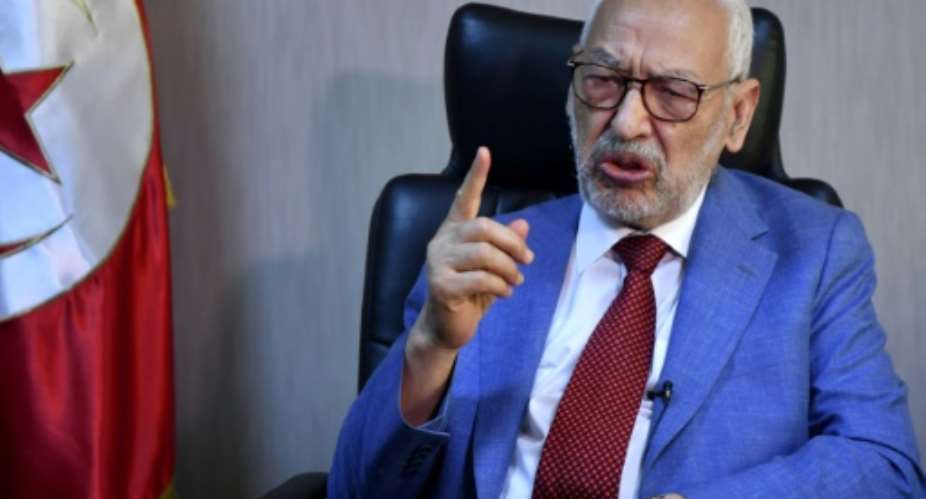Tunisia's parliament speaker Rached Ghannouchi, in an interview with AFP, has called for a return to democracy after President Kais Saied's shock power grab at the weekend.
Ghannouchi, also leader of the Islamist-inspired party Ennahdha, voiced regret at the lack of dialogue with the presidency, and warned that if no agreement is reached on the formation of a government and the reopening of the legislature, "we will invite the Tunisian people to defend their democracy".
Question: You have called for dialogue. Where do things stand now?
Answer: "There is no dialogue today with the president nor with his advisers. But we think we need a national dialogue.
"We are trying to use all peaceful means -- dialogue, negotiations, street pressure, pressure from organisations... internal and external pressure -- to bring back democracy."
Question: You mentioned early parliamentary elections. What would you be ready to negotiate?
Answer: "We are ready to make all concessions so that democracy can return to Tunisia.
"The Tunisian constitution is more important than our staying in power. We are always ready for all concessions in the context of a return to democracy, and not the imposition of dictatorship and a coup d'etat."
Question: Some of your supporters are calling on donors to suspend aid to Tunisia to put pressure on President Saied. Does the solution for Tunisia lie abroad?
Answer: "We are not calling for starving the Tunisian people. We care about the interests of the Tunisian state, the Tunisian people, and it does not depend on who is in power."
Question: Isn't Ennahdha paying for its mistakes, its alliances with politicians prosecuted for corruption, its reluctance to set up the constitutional court on time?
Answer: "There have been mistakes in the economic and social fields, and Ennahdha bears a part of the responsibility, which corresponds to the part of power it has held.
"The parties in parliament made the mistake of not managing to establish a constitutional court... President Saied has used the absence of a constitutional court to monopolise the interpretation of the constitution and to make himself the constitutional court, and that's an error in which we all bear a part of the responsibility."
Question: How do you see the future?
Answer: "We must not reach the 30 days desired by the president (the time limit for emergency measures under the constitution). This should be the maximum limit to the suspension of the institutions and the constitution, and during this period there should be discussions between the president and the political parties to agree on a prime minister, on a government and on the presentation of this government to parliament before the end of the month."
Question: Are you calling on your supporters to mobilise?
Answer: "Since the start, we have called on the people to fight the coup d'etat with all peaceful means, and this resistance will continue with peaceful means.
"If there is no agreement on the return of parliament, on the formation of a government and its presentation to parliament, the Tunisian street will undoubtedly mobilise and we will invite the Tunisian people to defend their democracy.
"He (Saied) put locks on parliament, a tank at its door, that's a very serious error to say the least."





 This IMANI job no dey pap; the people you are fighting for are always fighting y...
This IMANI job no dey pap; the people you are fighting for are always fighting y...
 Prof. Naana Opoku-Agyemang has changed; you can see a certain sense of urgency –...
Prof. Naana Opoku-Agyemang has changed; you can see a certain sense of urgency –...
 MFWA Executive Director slams Akoma FM for engaging in ‘irresponsible’ media pra...
MFWA Executive Director slams Akoma FM for engaging in ‘irresponsible’ media pra...
 ‘Women must become millionaires too’ — Prof Jane Naana on establishment of Women...
‘Women must become millionaires too’ — Prof Jane Naana on establishment of Women...
 Some believe only in Ghanaian votes, not Ghana — Kofi Asare jabs politicians
Some believe only in Ghanaian votes, not Ghana — Kofi Asare jabs politicians
 Plan to make BEST sole aggregator of Sentuo Oil Refinery will create market chal...
Plan to make BEST sole aggregator of Sentuo Oil Refinery will create market chal...
 2024 elections: I can't have the man I removed from office as my successor — Aku...
2024 elections: I can't have the man I removed from office as my successor — Aku...
 2024 Elections: Immediate-past NPP Germany Branch Chairman garners massive votes...
2024 Elections: Immediate-past NPP Germany Branch Chairman garners massive votes...
 Gov’t focused on making Ghana energy self-sufficient, eco-friendly – Akufo-Addo
Gov’t focused on making Ghana energy self-sufficient, eco-friendly – Akufo-Addo
 April 25: Cedi sells at GHS13.74 to $1, GHS13.14 on BoG interbank
April 25: Cedi sells at GHS13.74 to $1, GHS13.14 on BoG interbank
